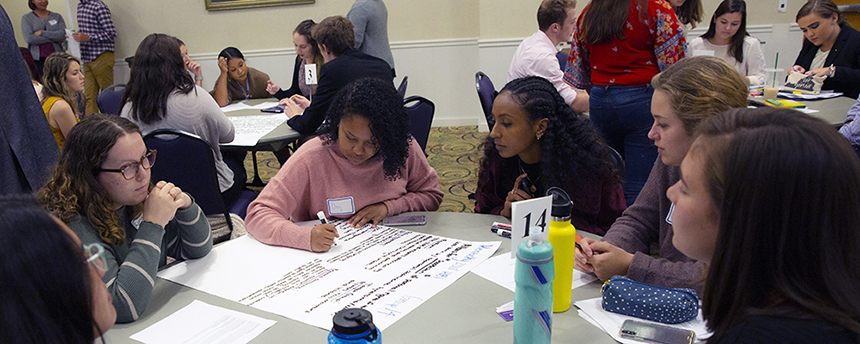
The College of Health and Behavioral Studies sponsors a variety of short-term interprofessional and interdisciplinary seminars and workshops for students at the undergraduate and graduate levels. These activities are most often associated with existing disciplinary courses and are thus part of the academic work required for those courses. Other experiences might be co-curricular opportunities.
This four-hour long event provides an interprofessional education case study with participation from the following JMU programs: Athletic Training, Dietetics, Health Services Administration, Nursing, Occupational Therapy, Speech Language Pathology, and Physician Assistant. Students are given a patient scenario in advance to prepare their professional role in the continuum of care for the patient. Students are placed in interprofessional teams facilitated by faculty members from diverse professions. Teams discuss the varying roles among the health professions in providing coordinated care for the patient. The initial case was based on a real case of a patient who received a major head injury during a collegiate football game.
Interdisciplinary teaming and collaboration are not just necessary in health settings, but also in schools; however, many professionals get little specific training for this type of work during their education. Yet, studies have shown that effective collaborative techniques must be developed, taught, and practiced in order to build competency and produce effective outcomes in education. JMU faculty developed a one-day workshop, IPE in Schools, with participation from nursing, school psychology, school counseling, occupational therapy, exceptional education, communication sciences and disorders and social work, combining graduate and undergraduate students. The workshop has two main goals; first, to expose students to a process for building interprofessional collaboration with other school professionals, and second, to send students into the workforce with interprofessional skills to positively impact systems where they would be employed.
The IPE in Schools workshop provides a series of interprofessional activities including student presentations about the role of their profession in a school setting, discussing case scenarios to include diverse professional perspectives, developing treatment plans and identifying ethical issues. Wrap-up activities involve reflection on the day’s experiences and future application. A mixed method design was used to examine the impact of the workshop in helping students to integrate IP competencies such as communication and team-based care. The Attitudes Toward Health Care Teams Scale (ATHCT) captured quantitative changes in students’ attitudes about interprofessional collaboration. Qualitative analysis of students’ reflections captured the richness of student experience and informed future educational experiences.
James Madison University’s Health Policy Collaborative (HPC), developed in 2014, includes partners from Nursing, Social Work, Communication Sciences and Disorders, Health Sciences, Dietetics, and Business. The HPC’s signature event is the bi-annual Health Policy Summit (HPS), a half-day, team-based (Michaelsen & Sweet, 2008) experience for 250–300 students. Focused on a “hot topic” health care policy issue, students are placed into interprofessional teams where they take an individual readiness test, a group readiness test and discuss these with faculty facilitators. The teams then participate in a problem-solving exercise focused on the “hot topic”.
In 2016, students considered the state-level decision to reject federal dollars for Medicaid expansion. Teams developed a proposal for providing care to 400,000 people left uninsured and then created poster presentations. Local legislators attend the summit, view the posters, and talk with the students. The summit concludes when the student participants choose the three best proposals and those teams present their plans to the legislators and summit attendees. Research on the summit has identified several benefits for students’ understanding of policy and interprofessional teaming.
Student Learning Objectives:
- Students will work in interprofessional teams and be exposed to the variety of knowledge and skills in professions other than their own.
- Students will build relationships with their teammates prior to, and during, the bi-annual Health Policy Summit.
- Students will develop an understanding of the role of a citizen in advocacy about public policy and taking action on social problems.
- Students will develop a foundational understanding of the opioid epidemic and the prevention, emergency and intervention approaches for individuals, families, communities, and populations.
- Students will utilize their skills and resources to develop a proposed policy solution to the opioid epidemic for sharing with other participants.
- Students with the best proposals, as determined by their peers utilizing the 8 Key Questions as a framework for decision making, will present their proposals to legislators attending the summit.
This is a four-hour welfare simulation experience developed by the Reform Organization of Welfare Education Association of Missouri (ROWL). It is designed to sensitize health and human service students to the realities faced by low-income families. The simulation places participants “in the shoes” of a family member in a low socioeconomic situation. The task of the families is to provide for basic necessities and shelter for one month consisting of 4 fifteen minute “weeks”.
In the process of trying to take care of their families, participants gain an understanding of poverty by experiencing some of the confusion, defeat, frustration, exhaustion and despair that low income families experience. Students reflect on the experience and apply interprofessional/interdisciplinary competencies to addressing the individual and systemic issues associated with life in the state of poverty.
The purpose of the BCHW is to provide a forum for students and faculty across disciplines to acknowledge personal, professional and organizational dynamics that influence the quality of their patient care and their interactions with colleagues. This four-hour workshop convenes students from health and human services programs to explore vital cultural issues of diversity, power, privilege and systemic aspects of racism and bias.
Students and faculty are invited to examine personal, professional and institutional values that influence their thoughts, feelings and actions through a series of shared readings, video, group presentations, and respectful interprofessional discussion.

